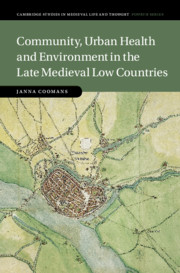Book contents
- Community, Urban Health and Environment in the Late Medieval Low Countries
- Cambridge Studies in Medieval Life and Thought Fourth Series
- Community, Urban Health and Environment in the Late Medieval Low Countries
- Copyright page
- Contents
- Figures
- Maps
- Tables
- Acknowledgements
- Note on Currency, Wages and Dates
- Abbreviations
- Introduction
- 1 Galenic Health and the Biopolitics of Flow
- 2 The Purged Urban Heart
- 3 Food, Health and the Marketplace
- 4 Good Neighbours
- 5 Plague in Urban Healthscapes
- 6 Building Community, Balancing Public Health and Order
- Conclusion Urban Health Expeditions
- Bibliography
- Index
3 - Food, Health and the Marketplace
Published online by Cambridge University Press: 17 August 2021
- Community, Urban Health and Environment in the Late Medieval Low Countries
- Cambridge Studies in Medieval Life and Thought Fourth Series
- Community, Urban Health and Environment in the Late Medieval Low Countries
- Copyright page
- Contents
- Figures
- Maps
- Tables
- Acknowledgements
- Note on Currency, Wages and Dates
- Abbreviations
- Introduction
- 1 Galenic Health and the Biopolitics of Flow
- 2 The Purged Urban Heart
- 3 Food, Health and the Marketplace
- 4 Good Neighbours
- 5 Plague in Urban Healthscapes
- 6 Building Community, Balancing Public Health and Order
- Conclusion Urban Health Expeditions
- Bibliography
- Index
Summary
traces how health concerns informed good governance of the urban food trades. Urban authorities, in negotiation with food-related guilds and traders, established, intervened in, and physically altered food markets in order to expel wares deemed unsafe for consumption. The central position of food in Galenic medical theories of health preservation was reflected in an urban context especially in the policies around three highly regulated products: meat, fish and grain. Market inspectors, and likely also vendors and buyers, applied medical knowledge on preservation and disease risks. The extensive regulation of grain and bread provision closely related to issues of urban order and threat of shortages. Finally, butchering in particular was also targeted as a source of environmental pollution through coordinating the disposal of offal.
Keywords
- Type
- Chapter
- Information
- Publisher: Cambridge University PressPrint publication year: 2021

